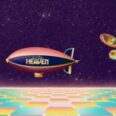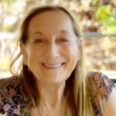
As a tribute to Edward C. Stone’s scientific contributions and farsighted leadership, the W. M. Keck Foundation has made a gift of $4 million to endow a new faculty position at Caltech. The Edward C. Stone Professorship will sharpen the Institute’s competitive edge in recruiting and retaining radically inventive scientists in astronomy, planetary science, and related fields, and ensure that the scholars who hold this position have resources to pursue their most creative and ambitious ideas. It also celebrates the enduring and fruitful partnership between the two institutions.
“Ed Stone is an inspirational figure, as an explorer of unknown realms, as a sage leader of the Jet Propulsion Laboratory, and as an eloquent expositor of science,” says Caltech president Thomas F. Rosenbaum, the Sonja and William Davidow Presidential Chair and professor of physics. “The Stone Professorship deepens the long-standing collaboration between the Keck Foundation and Caltech by positioning generations of faculty to follow in Ed’s footsteps on their own paths of discovery.”

Physicist Christopher Martin, director of Caltech Optical Observatories, has been named the inaugural Stone Professor effective July 1.
“Ed Stone has had a profound influence on me—and many other scientists—throughout his remarkable career,” Martin says. “His sense of wonder about visiting other planets; his sheer joy in conceiving an instrument, building it, launching it, and seeing the data come in; his curiosity and excitement about the power of space experiments to answer big questions taught me to never stop exploring new possibilities and asking new questions. No words could express the honor I felt when I received word about this appointment.”
Pressing the Frontiers
“I think as humans, we always have been pressing the frontiers. You learn by observing and calculating, and each time you do, you find that nature’s even more powerful than you can imagine.” — Ed Stone
Born and raised in Iowa, Stone was a graduate student at the University of Chicago when he read about Russia’s launch of the Sputnik satellite. The story galvanized him to chart a course in space science. After earning a PhD in physics in 1964, he came to Caltech to work as a research fellow with Rochus Vogt, now the R. Stanton Avery Distinguished Service Professor and Professor of Physics, Emeritus.
Thus began six decades of discovery. Stone joined the Caltech faculty as an assistant professor in 1967 and was named the David Morrisroe Professor of Physics in 1994. From 1983 to 1988, he chaired the Division of Physics, Mathematics and Astronomy (PMA), then served as vice president for astronomical facilities from 1988 to 1990 and as vice provost for special projects from 2004 to 2022.
“For many decades, Ed was head of Caltech’s Space Radiation Laboratory, which I joined when I came to Caltech,” says Fiona Harrison, the Harold A. Rosen Professor of Physics and holder of the Kent and Joyce Kresa Leadership Chair in PMA. “Not only did Ed lead the lab in developing Explorer missions like the Advanced Composition Explorer, and instruments for the Parker Solar Probe, but he also was a wonderful mentor who helped me navigate the challenges of being a NASA principal investigator. He influenced many scientists throughout his career, leaving a legacy that will be passed down through generations.”
As director of the Jet Propulsion Laboratory, which Caltech manages for NASA, from 1991 to 2001, Stone oversaw numerous missions that generated new knowledge about our solar system. Highlights from his decade of leadership range from the Mars Pathfinder and its toaster oven-sized Sojourner rover—which set the standard for all subsequent Mars rovers—to Cassini and its exploration of the planet Saturn.

Credit: NASA/JPL-Caltech
Stone is perhaps best known as project scientist for Voyager, NASA’s longest-operating mission. He served in this capacity from 1972 until he retired in 2022 to return to teaching and research at Caltech. Built in-house and operated by JPL, Voyager’s twin spacecraft launched in 1977 with the goal of studying Jupiter and Saturn. The two-planet mission was extended to four when Voyager 2 went on to explore Uranus and Neptune, becoming the only spacecraft to have visited these giant outer planets. In 2012, Voyager 1 became the first human-made object to transcend the heliosphere, or protective bubble, that surrounds our solar system and enter interstellar space. Voyager 2 achieved this milestone in 2018. Forty-six years after launch, the Voyager Interstellar Mission is helping scientists answer questions about the shape of the heliosphere and its role in protecting Earth from interstellar particles and other radiation.
Stone also played a pivotal role in design development for the Thirty Meter Telescope, a next-generation instrument that will offer astronomers an unprecedented window to dark energy, black holes, galaxy formation, and the evolution of stars and planets. The telescope is being developed by a multi-national alliance that includes Caltech. Stone oversaw the project for 20 years, stepping down as executive director in May 2022.

In recognition of his accomplishments, Stone was elected to the National Academy of Sciences in 1984 and received the National Medal of Science from President George H. W. Bush in 1991. In 2013, during an appearance on the late-night television show The Colbert Report, Stone was surprised when host Stephen Colbert came onstage wearing a silver space suit and presented him with the NASA Distinguished Public Service Medal, the agency’s highest honor for a nongovernment individual. Among many other awards and accolades, Stone also received the prestigious Shaw Prize in Astronomy in 2019, commemorating his leadership of Voyager.
A Shared Spirit of Exploration
Stone’s influence and spirit of exploration have been magnified through his involvement with the Keck Foundation. For nearly 25 years he served on the board of the California Association for Research in Astronomy (CARA), where, as vice chair and chair during the late 1980s and early 1990s, he was a central figure in the development and construction of the W. M. Keck Observatory on Hawaii’s Maunakea. A joint effort of Caltech and the University of California, the observatory has become one of the most scientifically productive in the world. Its twin 10-meter telescopes have enabled numerous advances in astronomy and astrophysics, including the discovery of exoplanets and insights into the nature of black holes, the chemical composition and formation of the universe, and the genesis of planets, stars, and galaxies.
A W. M. Keck Foundation director, Stone also chaired the Keck Foundation’s Science and Engineering Committee for 24 years.
“This gift is an expression of gratitude for Ed’s many contributions to science as well as to the Keck Foundation,” says Stephen M. Keck, foundation co-chief executive officer. “He has advised the foundation for decades, translating complex proposals into lay terms, helping shape large grants such as the Keck Telescopes and the Keck Institute for Space Studies at Caltech, and leading our Science and Engineering Committee with skill and grace.”
Partners in Discovery: The W. M. Keck Foundation and Caltech
A generous and significant partner to Caltech for some 64 years, the W. M. Keck Foundation is dedicated to benefiting humanity by funding high-risk, high-impact endeavors across science, engineering, and medical research. It was established in 1954 by Superior Oil Company founder William Myron Keck and made its first gift to the Institute in 1959, supplying funds to create the W. M. Keck Engineering Laboratories.
Since then, the foundation has supported facilities and research programs in areas ranging from biomedical science to astronomy. The foundation has provided support for students and faculty as well, including the W. M. Keck Foundation Professorship in the Division of Geological and Planetary Sciences. Established 1982, the chair is currently held by Kenneth A. Farley, a pioneer in isotope geochemistry and project scientist for Mars 2020.
Caltech also is home to the Keck Institute for Space Studies (KISS), a “think and do tank” formed in 2008 with an initial eight-year grant of $24 million from the foundation. Now one of the top 12 technology think tanks in the United States, KISS brings together established as well as emerging scientists and engineers to develop new mission concepts and technologies. It has contributed to breakthroughs in a broad array of areas, including the first dating of rocks on the Martian surface and increased attention to wildfire detection and tracking using satellite data.
KISS has its headquarters in the W. M. Keck Jr. Center, a campus landmark that combines the historic Tolman/Bacher House with a modern conference facility. The center is named for W. M. “Bill” Keck Jr., a grandson of the founder and long-time foundation director.
The new Edward C. Stone Professorship links Stone’s scientific legacy to this abiding and impactful partnership.
“Much has been said about Ed’s tremendous efforts on behalf of the U.S. astronomy community, from his lead on the Voyager mission to his indefatigable work on the Thirty Meter Telescope,” says Keck Foundation co-chief executive officer Joseph Day. “With this gift, we thank him for all he has contributed to the W. M. Keck Foundation and to Caltech.”














 0 comments
0 comments


